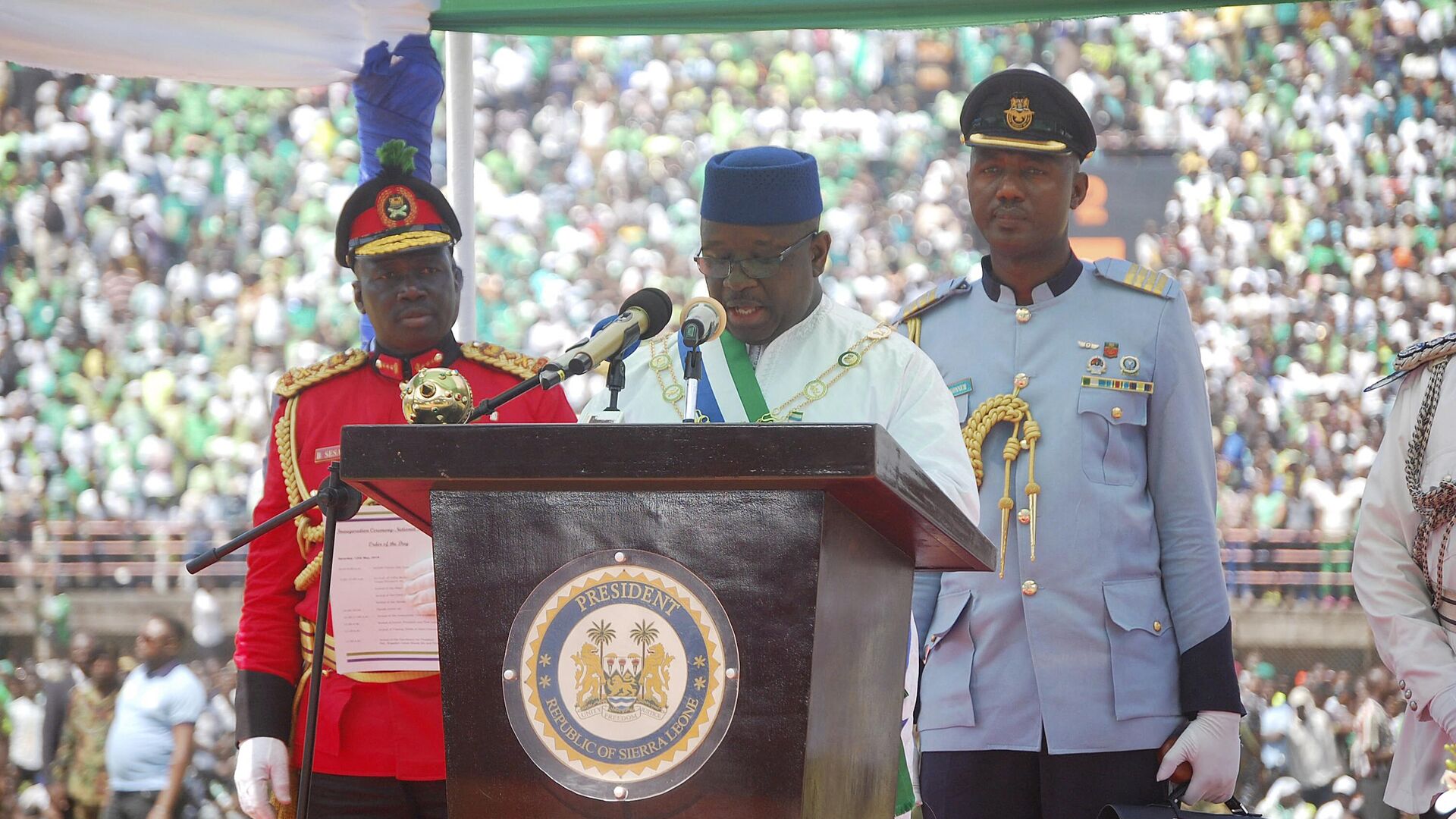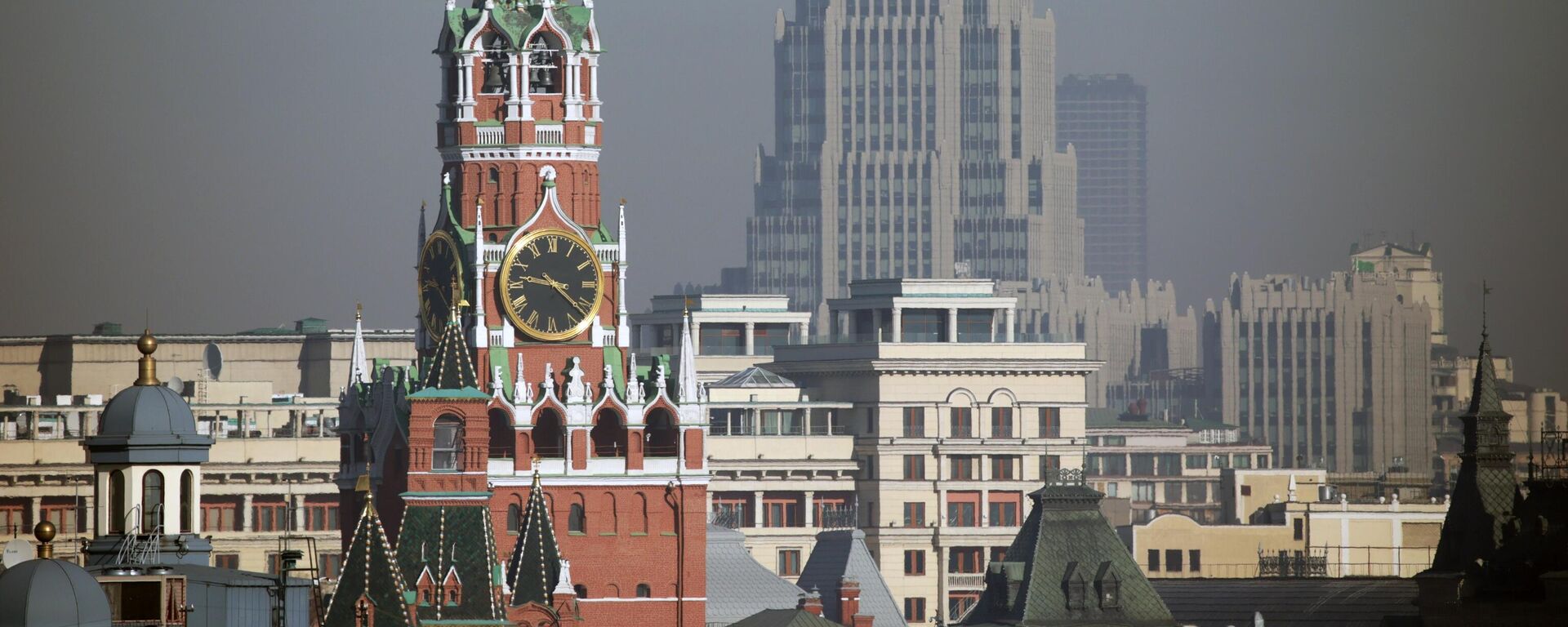https://en.sputniknews.africa/20230428/our-diversity-is-our-strength-sierra-leones-president-calls-for-unity-on-independence-day-1058892083.html
'Our Diversity is Our Strength': Sierra Leone's President Calls for Unity on Independence Day
'Our Diversity is Our Strength': Sierra Leone's President Calls for Unity on Independence Day
Sputnik Africa
On April 27, Sierra Leone marks the 62nd Independence Day, a national holiday that commemorates the day when the small West African nation gained independence from Great Britain in 1961, officially becoming a sovereign state.
2023-04-28T11:25+0200
2023-04-28T11:25+0200
2023-04-28T11:32+0200
sub-saharan africa
west africa
sierra leone
president
independence
british colonialism
colonialism
national holiday
https://cdn1.img.sputniknews.africa/img/07e7/04/1b/1058892566_0:154:3008:1846_1920x0_80_0_0_b8158f7c7fed371339e6935f23850665.jpg
Despite their differences, people of Sierra Leone are part of "one nation" that stands up for democracy and freedom, working for a brighter future for everyone, the country's President Julius Maada Bio said during his speech to the nation on Independence Day. The West African nation is home to about 18 ethnic groups, of which the two largest are the Temne and Mende peoples. According to the president, Sierra Leone is ethnically diverse but that diversity is the country's hidden power, something that makes it "a vibrant community".Path to Independence Sierra Leone was at the heart of the transatlantic slave trade. The country was used as both a departure point for thousands of slaves and a haven for liberated American slaves in the American War of Independence. In 1787, Freetown was founded as a home for repatriated former slaves. In the early 1800s, the British started to take control of Sierra Leone, establishing a colony in 1808. The British colonial rule lasted about 150 years. In contrast to some other African nations, Sierra Leone's freedom struggle was peaceful and smooth. In 1951, the Sierra Leone People’s Party (SLPP), which is now the ruling party, was founded. Later, the party managed to gain some local powers. The first parliamentary elections were held in May 1957, with the SLPP, headed by its leader Sir Milton Margai, obtaining the most seats.After a series of meetings, held in April 1960, Sierra Leone was granted its independence from the UK on 27 April 1961. Margai became the country's first prime minister. Speaking on the anniversary of this historic event, the incumbent president reiterated the country's commitment to uphold its democratic values and the constitution. Bio noted that his responsibility as leader is to stand against "elements that seek to disrupt" the peaceful coexistence of the nation's communities. Day of Reflection on the Past and the Pathway to FutureDuring decades since gaining independence, the country witnessed an upheaval in political activities, and made significant progress in socio-economic development. According to the president, Sierra Leone made "huge strides" in modernizing its infrastructure, managed to double access to energy across its territory, and attract foreign investment in its economy. Pointing out that a president's speech that day is especially important as it serves as a "connection with the past and the future", he recalled that the nation went through many struggles, and "climbed many hills together". In this regard, he noted that people of his country should stay united and continue to stand up for their freedom with hope and resilience. He noted that any anniversary is an occasion to reflect on "the journey travelled, the lessons learnt, and on the road ahead, opportunities to be seized and dreams to be achieved." During this holiday, the nation reflects on its history, on what it has achieved after 61 years of independence, and what the future holds for it.
https://en.sputniknews.africa/20230405/1058893162.html
west africa
sierra leone
Sputnik Africa
feedback@sputniknews.com
+74956456601
MIA „Rossiya Segodnya“
2023
News
en_EN
Sputnik Africa
feedback@sputniknews.com
+74956456601
MIA „Rossiya Segodnya“
Sputnik Africa
feedback@sputniknews.com
+74956456601
MIA „Rossiya Segodnya“
west africa, sierra leone, sierra leone's president maada bio, independence day, freedom, british colonialism
west africa, sierra leone, sierra leone's president maada bio, independence day, freedom, british colonialism
'Our Diversity is Our Strength': Sierra Leone's President Calls for Unity on Independence Day
11:25 28.04.2023 (Updated: 11:32 28.04.2023) On 27 April, Sierra Leone marked its 62nd Independence Day, a national holiday that commemorates the day when the small West African nation gained independence from Great Britain in 1961, becoming a sovereign state. Each year on this day, politicians deliver messages, recalling the path to independence and outlining the way forward.
Despite their differences, people of Sierra Leone are part of "one nation" that stands up for
democracy and freedom, working for a brighter future for everyone, the country's President Julius Maada Bio said during his
speech to the nation on Independence Day.
The West African nation is home to about 18 ethnic groups, of which the two largest are the Temne and Mende peoples. According to the president, Sierra Leone is ethnically diverse but that diversity is the country's hidden power, something that makes it "a vibrant community".
"Our diversity is our strength," he said, adding: "Our country is a richer ocean thanks to the many rivers flowing into her. We should all be proud of the diversity of ethnicities, cultures, religions and political views that coexist daily."
Sierra Leone was at the heart of the transatlantic slave trade. The country was used as both a departure point for thousands of slaves and a haven for liberated American slaves in the American War of Independence. In 1787, Freetown was founded as a home for repatriated former slaves.
In the early 1800s, the British started to take control of Sierra Leone, establishing a colony in 1808. The British colonial rule lasted about 150 years. In contrast to some other African nations, Sierra Leone's freedom struggle was peaceful and smooth.
In 1951, the Sierra Leone People’s Party (SLPP), which is now the ruling party, was founded. Later, the party managed to gain some local powers. The first parliamentary elections were held in May 1957, with the SLPP, headed by its leader Sir Milton Margai, obtaining the most seats.
After a series of meetings, held in April 1960, Sierra Leone was granted its independence from the UK on 27 April 1961. Margai became the country's first prime minister.
Speaking on the anniversary of this historic event, the incumbent president reiterated the country's commitment
to uphold its democratic values and the constitution. Bio noted that his responsibility as leader is to stand against "elements that seek to disrupt" the peaceful coexistence of the nation's communities.
"We should all remain vigilant and ready to stand against those who seek to divide us and manipulate our diversity to serve their interests," he said.
Day of Reflection on the Past and the Pathway to Future
During decades since gaining independence, the country witnessed an upheaval in political activities, and made significant progress in socio-economic development. According to the president, Sierra Leone made "huge strides" in modernizing its infrastructure, managed to double access to energy across its territory, and attract foreign investment in its economy.
"We have come a long way since the Sierra Leone of 1961, with its limited resources and infrastructure. Today, we have a growing population and modern technology that has improved the quality of life for all Sierra Leoneans," the president pointed out.
Pointing out that a president's speech that day is especially important as it serves as a "connection with the past and the future", he recalled that the nation went through many struggles, and "climbed many hills together". In this regard, he noted that people of his country should stay united and continue to stand up for their freedom with hope and resilience.
He noted that any anniversary is an occasion to reflect on "the journey travelled, the lessons learnt, and on the road ahead, opportunities to be seized and dreams to be achieved." During this holiday, the nation reflects on its history, on what it has achieved after 61 years of independence, and what the future holds for it.
"As we celebrate our 62nd Independence Day, let us remember our democratic values of unity, freedom, and justice for all […]. May our collective efforts bear fruit that will resonate for generations to come," the president concluded.


